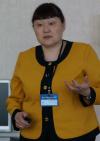1.Babinskiy M.B. Teoriya obrazovatelnogo protsessa (obschaya i spetsialnaya): monografiya / M. B. Babinskiy. - M.: Fizmatkniga, 2009. - 368 s.
2. Burtseva I. V. Aktualizatsiya chelovecheskogo potentsiala lits pozhilogo vozrasta kak rezultat samoobrazovatelnoy deyatelnosti // Problemyi i perspektivyi razvitiya obrazovaniya: materialyi mezhdunar. nauch. konf. (g.Perm, aprel2011 g.). - T. II. —Perm: Merkuriy, 2011. — S. 164-166.
3. Gaponenko A.L. Upravlenie znaniyami: kak prevratit znaniya v kapital / A. L. Gaponenko, T. M. Orlova. - Moskva: Eksmo, 2008 – 394 s.
4. Dvornikova E.V., Kosheleva A.V. Gerontoobrazovanie kak sposob integratsii pozhilyih lyudey v informatsionnoe obschestvo // Sotsialnyie i gumanitarnyie znaniya. – 2015, # 1(2). – S.128-133.
5. Dementsiya. Informatsionnyiy byulleten N°362, mart2015 g. // Vsemirnaya organizatsiya zdravoohraneniya. - [Elektronnyiy resurs]. – Rezhim dostupa: http://www.who.int/mediacentre/factsheets/fs362/ru/ (10.02.2016).
6. Ermak N.A. Pedagogicheskaya podderzhka kachestva zhizni pozhilyih lyudey. - Rostov-na-Donu: IPO PI YuFU, 2008. – 231 s.
7. Zaharov V. V. Evolyutsiya kognitivnogo defitsita: legkie i umerennyie kognitivnyie narusheniya // Nevrologiya, neyropsihiatriya, psihosomatika. – 2012, #2. - S.16-21.
8. Zaharov V.V., Yahno N.N. Narusheniya pamyati. M.: GEOTAR-Media, 2003. – 150 s;
9. Kunilskiy D. Intervyu s K.Kroo / Internet-zhurnal «Litsey» [Elektronnyiy resurs]. – Rezhim dostupa: http://gazeta-licey.ru/science/faces-of-science-in/item/4083-katalin-kroo-gumanitarnost-ehto-chelovechnost (10.09.2012).
10. Lesheva M.M., Aleksandrova E.A., Shuvalova R.R., Yakupov E.Z. Art-terapiya v neyroreabilitatsii afaziy u patsientov, perenesshih ostroe narushenie mozgovogo krovoobrascheniya po ishemicheskomu tipu // Vestnik sovremennoy klinicheskoy meditsinyi. – 2015, Prilozhenie #1. - S.68-71.
11. Lileykina A.S. Nekotoryie voprosyi organizatsii i metodiki obucheniya inostrannomu yazyiku kontingenta tretey vozrastnoy gruppyi // Psihologiya obrazovaniya v polikulturnom prostranstve. – 2015, # 31. – S.134-140.
12. Merkulov I.P. Kognitivnyie sposobnosti. – M.: In-t filosofii RAN, 2005. – 179 s.
13. Mikeshina L.A. Epistemologiya tsennostey / L. A. Mikeshina. - M. : ROSSPEN, 2007. - 438 s.
14. Novikov A.M. Osnovaniya pedagogiki. / Posobie dlya avtorov uchebnikov i prepodavateley. – M.: Izdatelstvo «Egves», 2010. – 208 s.
15. Noyndorfer L. Issledovanie potrebnostey lyudey luchshego vozrasta (Best Ager] metodami psihodramyi // Monitoring. – 2004, #4. - S.57-64.
16. Ortega-i-Gasset H. Missiya universiteta / H.Ortega-i-Gasset ; per. s ispan. M.Golubevoy, A.Korbuta. - Moskva : Izd. dom Gos. un-ta - Vyissh. shk. ekonomiki , 2010 – 139 s.
17. Ostapenko N.N., Sityaeva L.P. Gerontoobrazovanie kak faktor gumanizatsii etosa tretego vozrasta //Sotsiokulturnoe prostranstvo Rossii i zarubezhya: obschestvo, obrazovanie, yazyik. – 2015, # 4. – S. 155-165.
18. Reyting stran mira po pokazatelyu kachestva zhizni pozhilyih lyudey // Tsentr gumanitarnyih tehnologiy. Informatsionno-analiticheskiy portal. – [Elektronnyiy resurs]. – Rezhim dostupa: http://gtmarket.ru/ratings/global-age-wath-index/info (12.03.2016).
19. Rossiyskie banki stali aktivnee vyidavat kredityi pensioneram // Finansyi. Slon Magazine – onlayn-zhurnal ob ekonomike i politike. [Elektronnyiy resurs]. – Rezhim dostupa: https://slon.ru/posts/67667 (06 maya2016 g.).
20. Ruliene L.N. Regionalnyiy informatsionno-obrazovatelnyiy portal kak forma integratsii Internet-resursov /L.N.Ruliene [i dr.] // Otkryitoe i distantsionnoe obrazovanie. -Tomsk, 2009. - # 3 (35). - S. 51-56.
21. Sverkunova T.N., Borisova E.A. Gerontoobrazovanie kak forma sotsialnoy podderzhki lyudey starshego vozrasta // Vologdinskie chteniya. – 2009, # 74. – S.186-189.
22. Sidorchuk T.A. Obrazovatelnyie programmyi dlya pozhilyih lyudey // Izvestiya Saratovskogo universiteta. Novaya seriya. Akmeologiya obrazovaniya. Psihologiya razvitiya. – 2013, # 2(3). – S. 289-295.
23. Silivonik E.V. Psihologicheskiy aspekt lichnosti pozhilogo cheloveka // Uchenyie zapiski RGSU. - 2013, #2 (114). - S.169-174.
24. Smirnova T. V. Rossiyskie pensioneryi kak kadrovyiy rezerv malogo biznesa // Monitoring. – 2008, #1 (85). - S.121-127.
25. Soloveva N.A., Borisov D.I. Gerontoobrazovanie kak odno iz usloviy uchastiya pozhilyih lyudey v publichnoy politike // Vestnik sotsialno-politicheskih nauk. – 2014, # 13. – S. 54-56.
26. Sorokin G.G. Institut gerontooobrazovaniya kak agent sotsialnoy adaptatsii starshego pokoleniya // Vestnik Nizhegorodskogo universiteta im. N.I. Lobachevskogo. - Seriya: Sotsialnyie nauki. – 2015, # 2. – S.120-126.
27. Ursul A.D. Globalnyie protsessyi, bezopasnost i ustoychivoe razvitie // Vek globalizatsii. – 2008, #1. - S.17-22.
28. Filyakova A.K. Art-terapevticheskaya praktika v hudozhestvennyih muzeyah Rossii i Velikobritanii // Vestnik SPbGUKI. – 2013, #4 (17). - S.122-125.
29. Frolovskaya M.N. Dialogicheskoe vzaimodeystvie v pedagogicheskom obrazovanii // Izvestiya AltGU. – 2013, #2 (78). - S.71-74.












